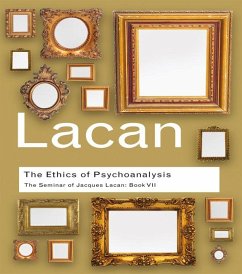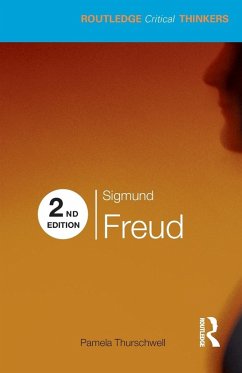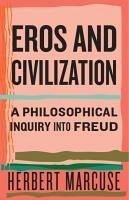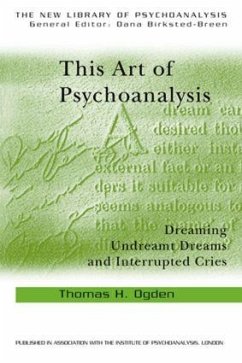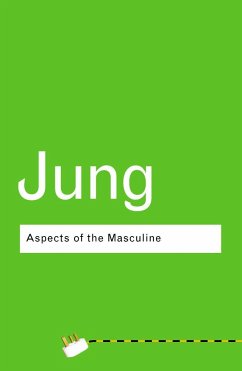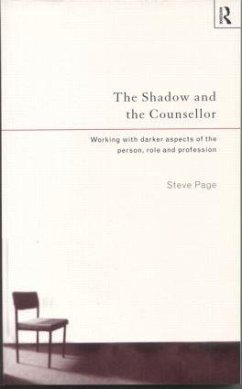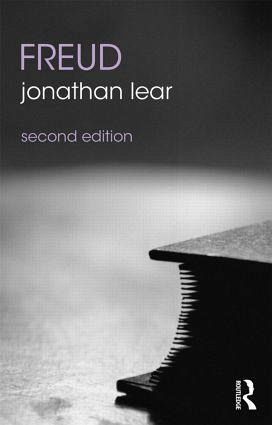
Jonathan Lear (USA University of Chicago)
Broschiertes Buch
Freud
Versandkostenfrei!
Versandfertig in 6-10 Tagen

PAYBACK Punkte
11 °P sammeln!





In this fully revised and updated second edition, the author clearly introduces and assesses all of Freud's thought, focusing on those areas of philosophy on which Freud is acknowledged to have had a lasting impact. Essential reading for anyone in the humanities, social sciences and beyond.
Jonathan Lear is the Roman Family Director of the Neubauer Collegium for Culture and Society at the University of Chicago, USA. He is also the John U. Nef Distinguished Service Professor in the Committee on Social Thought and the Department of Philosophy. He is a trained psychoanalyst, and the author of several acclaimed books on philosophy and psychoanalysis, including Aristotle: The Desire to Understand; Love and Its Place in Nature ; Open Minded; Happiness, Death and the Remainder of Life and Radical Hope: Ethics in the Face of Cultural Devastation. His most recent book is A Case for Irony (2011). He is a recipient of the Andrew W. Mellon Foundation Distinguished Achievement Award.
Produktdetails
- The Routledge Philosophers
- Verlag: Taylor & Francis
- Artikelnr. des Verlages: Y148951
- 2. Aufl.
- Seitenzahl: 262
- Erscheinungstermin: 5. Januar 2015
- Englisch
- Abmessung: 216mm x 140mm x 14mm
- Gewicht: 322g
- ISBN-13: 9780415831802
- ISBN-10: 0415831806
- Artikelnr.: 41611109
Herstellerkennzeichnung
Libri GmbH
Europaallee 1
36244 Bad Hersfeld
gpsr@libri.de
"Probably the best philosophical introduction into the central ideas and concepts of Freud's theories and practice." - The Guardian
Praise for the first edition:
"Jonathan Lear is one of the most subtle and original thinkers in psychoanalysis. So a book by him simply called Freud should attract everyone is at all psychoanalytically minded. They will not be disappointed. This is simply the best introduction to Freud I know." - Marcia Cavell, The International Journal of Psychoanalysis
"This book will be viewed by philosophers interested in psychoanalysis as a major contribution. It will also be read and
Praise for the first edition:
"Jonathan Lear is one of the most subtle and original thinkers in psychoanalysis. So a book by him simply called Freud should attract everyone is at all psychoanalytically minded. They will not be disappointed. This is simply the best introduction to Freud I know." - Marcia Cavell, The International Journal of Psychoanalysis
"This book will be viewed by philosophers interested in psychoanalysis as a major contribution. It will also be read and
Mehr anzeigen
intensively discussed by many professors of literature and of intellectual history who lecture on Freud." - Richard Rorty
"If I were to answer the question: who, among contemporary psychoanalysts, is best qualified to write an introduction to Freud as a philosopher, my choice would be: Jonathan Lear." - Slavoj Zizek, University of Ljubljana, Slovenia
"Jonathan Lear succeeds brilliantly in revealing Freud's philosophical significance ... a philosophically ambitious, passionate and exciting book." - Sebastian Gardner, University College London, UK
"Lear does very well to explain a fundamental modification in Freud's clinical work...this is definitely worthwhile for anyone wanting a serious briefing on the undoubted accomplishment on classical Freudian psychoanalysis." -Joseph Schwartz, New Humanist
"This is a lucid exegesis of Freud's conception of the mind, and a satisfying demonstration of its enduring value. Freud's loudest detractors often seem simply incapable of understanding him; they will no longer have that excuse." - Mark Solms, University of Cape Town, South Africa, and International Neuro-Psychoanalysis Centre, London, UK
"First rate - Lear captures the wider philosophical importance of Freud: how he makes us rethink our conceptions of ourselves as human beings, and the implications of this for morality and religion. A superb volume, and a terrific addition to the series." - John Cottingham, University of Reading, UK
"If I were to answer the question: who, among contemporary psychoanalysts, is best qualified to write an introduction to Freud as a philosopher, my choice would be: Jonathan Lear." - Slavoj Zizek, University of Ljubljana, Slovenia
"Jonathan Lear succeeds brilliantly in revealing Freud's philosophical significance ... a philosophically ambitious, passionate and exciting book." - Sebastian Gardner, University College London, UK
"Lear does very well to explain a fundamental modification in Freud's clinical work...this is definitely worthwhile for anyone wanting a serious briefing on the undoubted accomplishment on classical Freudian psychoanalysis." -Joseph Schwartz, New Humanist
"This is a lucid exegesis of Freud's conception of the mind, and a satisfying demonstration of its enduring value. Freud's loudest detractors often seem simply incapable of understanding him; they will no longer have that excuse." - Mark Solms, University of Cape Town, South Africa, and International Neuro-Psychoanalysis Centre, London, UK
"First rate - Lear captures the wider philosophical importance of Freud: how he makes us rethink our conceptions of ourselves as human beings, and the implications of this for morality and religion. A superb volume, and a terrific addition to the series." - John Cottingham, University of Reading, UK
Schließen
Für dieses Produkt wurde noch keine Bewertung abgegeben. Wir würden uns sehr freuen, wenn du die erste Bewertung schreibst!
Eine Bewertung schreiben
Eine Bewertung schreiben
Andere Kunden interessierten sich für




